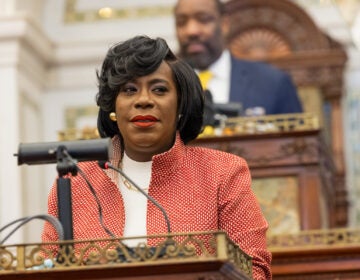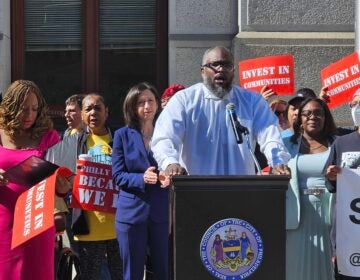7 takeaways from Mayor Jim Kenney’s $5 billion spending plan
Philadelphia Mayor Jim Kenney proposes his last budget before running for re-election Thursday. Here are the top seven items to expect.

Philadelphia Mayor Jim Kenney, left, shakes hands with members of City Council after speaking at City Hall in Philadelphia, Thursday, Nov. 2, 2017. (AP Photo/Matt Rourke)
This story originally appeared on PlanPhilly.
—
Mayor Jim Kenney’s fourth budget address will put forward a modest agenda focused on improving government services in the final year of what he hopes is his first term.
Previous budget proposals called for creating the sweetened beverage tax to pay for a major investment in public services like rec centers and pre-K, while last year Kenney asked for a property tax increase to fund a large local funding boost to the Philadelphia School District.
This year the mayor isn’t asking for any new tax increases or radical policy shifts, which is not surprising. Kenney and everyone on City Council face re-election this year.
But there is plenty for Philadelphia residents to pore over in his $5 billion budget proposal. Among the high points: a few measures that indicate Kenney takes notice of some — but not all — of the gripes clogging his Twitter feed.
Here are five quick takeaways in advance of Mayor Kenney’s address to City Council on Thursday morning.
More money for schools
The city’s revenues are projected to total almost $4.9 billion this fiscal year, a result of a tax base that’s seen healthy growth in recent years. Philly saw a 10.8 percent growth in revenues between fiscal years 2017 and 2018, but it slowed and is expected to continue to ease up as the national economy cools.
The Kenney administration is taking advantage of the city’s fiscal health to keep pace with growing costs for schools and pensions — without making cuts in the rest of the budget. Kenney was elected with a promise to improve public schools and return them to local control, and his budget for schools represents the single largest spending increase over last year, growing by $33 million.
Pensions… and a little cushion
Beyond the investments to stabilize and increase the city’s contributions to the school district, Kenney’s big-ticket items include the municipal pension fund (which will increase by almost $30 million), and the rainy day fund (which will grow more than $14 million).
These investments are the quiet priorities that signal the Kenney’s administration’s plan to concentrate on maintaining course in the year ahead. But they are also the kind of spending priorities that can become huge headaches if they are not managed well.
Philadelphia’s underfunded pension system has been a cause of anxiety for years, but this budget projects meeting the goal of covering 80 percent of pension obligations by fiscal year 2029 (a year ahead of schedule) and 100 percent four years after that. There are currently $8 billion in unfunded pension liabilities.
Potholes, property assessments and libraries
The Kenney administration is framing the budget proposal this year as a commitment to improving government services. New allocations are proposed for agencies that provide public services including the Office of Property Assessment ($1.9 million extra annually) and the library system ($2.5 million).
Library closures and reduced hours at neighborhood branches inspired protests in 2018. Property assessments inspired homeowners to lawyer up, with allegations that the city’s formula for determining property taxes is unfair.
Potholes top the list of things Philadelphians complain about and so it’s not surprising that street repair is another budget priority. At $200 million over five years, the new spending on street repair ranks as the largest line item in the capital program
The money will pay for a third paving crew, an increase in firepower that will help the city resurface and repave 131 miles annually, the administration projects.
Cash for more police, firefighters, violence prevention
The mayor’s budget proposal places a heavy emphasis on public safety investments, which covers everything from new police and fire vehicles to the new law enforcement headquarters at 400 North Broad Street It also includes $30 million for a five-year comprehensive anti-violence program. The spending comes as the city confronts a spike in homicides.
Spending on the Philadelphia Police Department will increase by $29.7 million. This will cover wage increases, hiring 50 new officers, and 1,500-body cameras for the effort to ensure that all officers have that equipment by fiscal year 2021.
The Philadelphia Fire Department will be hiring an additional 120 firefighters, using $28.4 million in city funds and $16.6 million from a federal SAFER grant. That will allow the city to expand fire capacity to a level not seen since the Great Recession.
$80 million for affordable housing
Housing and land use issues dominated the policy agenda in City Council in 2018. The budget sends some olive branches into the arena
In September, the Kenney administration defeated a construction tax proposed by City Council President Darrell Clarke by offering $53 million from the general fund to support affordable housing. The administration pegged the amount they would provide for housing to the amount of new revenue generated by properties that were coming off the 10-year property tax abatement, a controversial tax break that the city uses to spur new development.
But the administration is now saying that the amount the city is receiving from properties coming off the abatement is higher than previously estimated, and so, instead they will be devoting $80.4 million over five years to affordable housing. (Council President Clarke has vowed to get them to round it up to an even $100 million.)
“By using revenue from expiring abatements, we can ensure all Philadelphians benefit from our real estate boom,” the mayor said at a late February press conference. The tax abatement has come under sustained criticism over the last year, as neighborhood groups have pressured City Council to end or reform the legislation.
$36 million for opioid emergency
In October, Mayor Kenney declared an emergency to deal with the opioid crisis that caused more than 1,100 overdose deaths in Philadelphia last year.
The city’s response includes making the overdose reversal drug known as Narcan broadly available. In 2018, paramedics, police officers, and SEPTA employees administered it about 3,000 times. Other measures included mobile units equipped to dispense medication-assisted treatment and stronger measures to combat withdrawal symptoms among prison inmates.
Kenney’s budget calls for almost $36 million to be spent on addressing the emergency over five years. The great majority of that money, $26.3 million, will be spent to bolster the Office of Homeless Services’ ability to provide housing to those in need.
A further $6.5 million will be provided to the Department of Behavioral Health and Intellectual Disability Services for outreach and needle exchange efforts, with $3.1 million going to the Managing Directors Office for supports in the communities most affected by the crisis.
Street sweeping is a small-ticket item
The city is also facing criticism for its lack of a comprehensive street sweeping program. Philadelphia is one of the only major cities that doesn’t regularly sweep every street. The proposed 2019 investment in those services is small in comparison to the repaving campaign, just $2.3 million.
Pilot programs on the dirtiest streets are expected to roll out this spring. On top of that, $250,000 annually will be allocated for the Commerce Department’s cleaning program, which supports nonprofits to hire crews to sweep neighborhood commercial corridors. Commerce will also allocate $500,000 for the Community Development Corporation to work in commercial corridors.
Another major line item, by state mandate, is $22 million for new voting machines, which the city is required to purchase and have ready for the 2020 elections. Additional monies will be allocated for security, maintenance, and implementation costs for the new system.
—
Correction: An earlier version of this article misstated the amount of spending proposed for the Philadelphia Police Department. The erroneous information came from material released by the Office of the Mayor.
WHYY is your source for fact-based, in-depth journalism and information. As a nonprofit organization, we rely on financial support from readers like you. Please give today.







